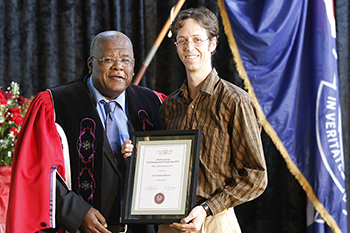Latest News Archive
Please select Category, Year, and then Month to display items
23 April 2020
|
Story Cornelius Hagenmeier
|
Photo Pixabay

The iKudu project, which is an European Union-funded Capacity Building in Higher Education (CBHE) project, has recently launched its blog, which aims to amplify the diverse voices of all iKudu stakeholders. In this space, members of the iKudu team will regularly share their views on the project and related international education topics.
The iKudu project focuses on developing a contextualised South African concept of Internationalisation of the Curriculum (IoC), which integrates Cooperative Online International Learning (COIL) virtual exchanges. The project was launched by the UFS in 2019, together with nine European and South African partner universities. It is funded by the European Union’s Erasmus+ programme with EUR999 881 (approximately R20 million) and is implemented over a three-year period.
The iKudu project is based on the fundamental belief that it is necessary to rethink internationalisation in an uncertain world. First, it is crucial to recognise and transform the power dynamics underlying international academic collaboration. Second, it is essential to develop pedagogies that allow every student to participate in international education, integrating technology where appropriate.
However, while all stakeholders agree on the fundamental tenets of the project and its principal goals, all iKudu stakeholders contribute different perspectives. In the blog, the iKudu stakeholders will provide a space for intellectual discourse on the project and related international education topics, which will allow constructive and critical engagement.
The link to the blog can be found at: https://www.ufs.ac.za/ikudu/ikudu-blogs/Transforming-Curricula-through-Internationalisation-and-Virtual-Exchanges
UFS Vice-Chancellor’s vision for 2016: R100 million before September
2016-03-03

|
At the official opening of the University of the Free State (UFS), held on 19 February 2016 on the Bloemfontein Campus, Prof Jonathan Jansen, Vice Chancellor and Rector, announced that his priority for the year is to raise R100 million. Deserving students who cannot afford to study will receive bursaries through the Student Bursary Fund Campaign.
Staff will also have the opportunity to contribute to the fund.
Prof Jansen thanked staff for their hard work in the midst of what he described as “by far the most difficult year for admissions, registration, accommodation, and student finance”. The heightened expectations of students after FeesMustFall and the limited capacity of the university to meet the desires of students took its toll on staff.
Because of the incredible strain taken by staff members, both emotionally and physically, the Vice-Chancellor gave staff the assurance that they will receive spiritual, emotional, and health support.
“Never before have I seen such dedication from all our staff to hold the university together in these trying times,” Prof Jansen said.
“Because of you, we have a record intake of first-year students into the UFS. We have had about 5 000 students on average in the past three years and, as of today, we are nearing 7000 first-years with the strong possibility that we will enroll several thousand more students, once the new South Campus registrations come on line later this year. By mid-2016, we will exceed our own target of 8 000 students,” said Prof Jansen.
He stipulated that it is not only good for the finances of the university but also for the youth of the country who can access a quality university in central South Africa where the safety of its staff and students is a priority.
Another highlight at this event was announcing Dr Christian Williams from the Department of Anthropology as the winner of the 2016 Distinguished Scholar Book Prize for his book, National liberation in postcolonial southern Africa: a historical ethnography of SWAPO’s exile camps.
Amidst the sad episodes of violence and destruction on campuses around South Africa, Prof Jansen highlighted how the UFS will – through a seven-point approach - manage the university during these difficult times:
1. Doing everything within our capacity to meet the needs of staff and students
2. Upholding the right to peaceful protest in our democracy
3. Acting swiftly against any unlawful actions by students or workers
4. Upholding the authority of the unions (only UVPERSU and NEHAWU)
5. Finding humane and just solutions to the problem of outsourcing
6. Not placing the UFS at financial risk by making irresponsible decisions
7. Maintaining an open door policy.